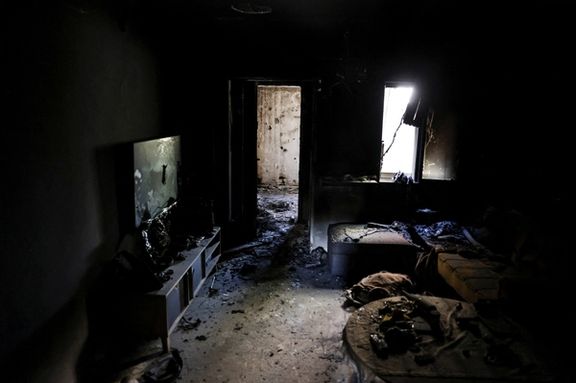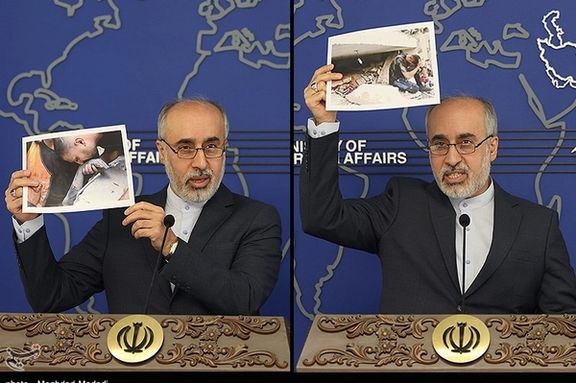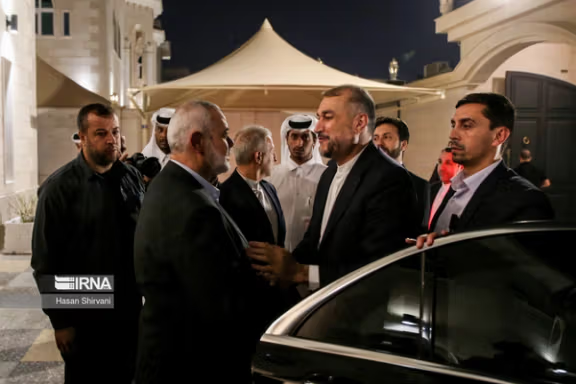Hamas' Bloody Massacre On Israel 'Legitimate Right,' Says Iran

Iran has defended the Hamas attack on Israel that has killed at least 1,500 as “a natural response within the framework of legitimate rights.”

Iran has defended the Hamas attack on Israel that has killed at least 1,500 as “a natural response within the framework of legitimate rights.”
Foreign Ministry spokesman Naser Kanaani said during his Monday press conference that “the actions taken by the resistance front were within their rights, in response to the Zionist crimes against Palestinians.”
Kanaani held photos of the aftermath of the bombing on Gaza which followed the infiltration of militants by air, land and sea, slaughtering hundreds of civilians, and reiterated Tehran’s warning that if the offensive on the enclave continues, the situation could escalate beyond control, “jeopardizing international peace and security.”
However, when he was directly asked about Iran engaging in the war in case of Israel's ground offensive in Gaza, Kanaani dodged a tangible response and only said that Hamas can defend itself. Thousands of Hamas operatives infiltrated Israel by land, air and sea on October 7, massacring hundreds of civilians and kidnapping at least 199 into Gaza, including women and children.

Kanaani said that the actions “cannot be limited to a single front,” and that Israelis "expose themselves to all sides that consider themselves committed to supporting the Palestinian people," suggesting its proxies on Israel's Lebanese and Syrian borders will once again be mobilized. On Sunday, Hezbollah began its most active day of attacks against Israel since the war began as tensions simmered and 28 towns and villages in Israel were subsequently evacuated.
Kanaani claimed that the Palestinian resistance represents the Palestinian nation against Israel, a statement that directly contradicts remarks by Mahmoud Abbas, the president of the State of Palestine and the Palestinian National Authority. Abbas criticized Hamas on Sunday but then quickly rescinded the comment after alleged pressure from Hamas which controls the Gaza Strip.
Palestinian news agency WAFA initially quoted Abbas telling Venezuelan President Nicolas Maduro that Hamas’ policies and actions “do not represent the Palestinian people", the Palestine Liberation Organization the only legitimate representative of the Palestinian people. The reference to Hamas was later removed, the statement only claiming "the PLO is the sole legitimate representative of the Palestinian people, and not the policies of any other organization.”

Iran’s Foreign Minister Hossein Amir-Abdollahian, who arrived back in Iran after a tour of Iraq, Syria, Lebanon and Qatar Monday, has been equally threatening in his language, warning of a “huge earthquake” in Israel if airstrikes continue on the Gaza Strip. Meanwhile, the regime continues to deny its being behind the war declared by Hamas on October 7.
Amir-Abdollahian met with leaders of Hamas, Hezbollah, and Islamic Jihad during his trips to gain accurate intelligence on the status of Hamas on the “battleground,” the Iranian diplomat said. Hamas has reassured Iran that it has the “necessary equipment” to confront Israel, not surprising after years of being funded at least $100m annually in addition to military and logistical support.
After his meeting with Hezbollah leader Hassan Nasrallah over the weekend, Amir-Abdollahian said “I know about the scenarios that Hezbollah has put in place. Any step the resistance will take will cause a huge earthquake in the Zionist entity.” Hezbollah, the biggest of Iran's proxies, garners at least $700m a year in funding, and is known to have a far greater arsenal at its fingertips thanks to regime support, which the group showcased just weeks ago at a military exhibitionfor the media.
The regime terms Israel "the Zionist entity" or "Zionist regime" and the "resistance" front or axis is the term to describe Iran's logistic, financial and intelligence support for Palestinian terrorist groups such as Hamas and Islamic Jihad. It also supports proxies on Israel's other borders, Iran and Lebanon, in addition to several others around the region.
Amir-Abdollahian is scheduled to travel to Saudi Arabia for an urgent open-ended extraordinary meeting of the Organization of Islamic Cooperation (OIC) on Wednesday to address the escalating war. The meeting was called by Riyadh, which until the war broke out was teetering ever closer to a normalization deal with Israel which Iran had vocally opposed, leading analysts to suggest the war was orchestrated to debilitate the talks.
While Iran tries to make it look like it is pursuing diplomatic means to end the crisis, the Islamic Republic’s authorities continue threatening Israel with destruction and are not shy about their military and intelligence support for Hamas. Echoing similar sentiments by Supreme Leader Ali Khamenei, Revolutionary Guard commander-in-chief Hossein Salami said Monday that the new Gaza war is “the first phase of the impending collapse of the Zionist regime.”
Iran sent a veiled warning through its UN mission on Saturday against Israel's potential ground invasion of Gaza. The Iranian message stressed that it does not want further escalation, but warned, "If the Israeli apartheid’s war crimes and genocide are not halted immediately, the situation could spiral out of control and ricochet far-reaching consequences".